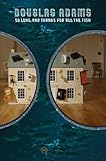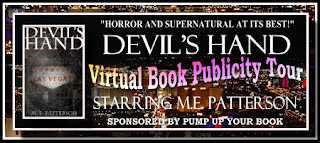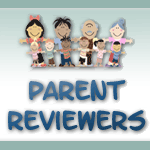Join M.E. Patterson, author of the supernatural fantasy novel, Devil’s Hand (Digimonkey Studios), as he virtually tours the blogosphere October 3 – November 23, 2011 on his first virtual book tour with Pump Up Your Book!
About the book...
A Las Vegas poker ace with supernatural luck is swept into a world-ending conflict between fallen angels and otherworldly shades, in a thrilling debut novel for readers who enjoy Dean Koontz, Jim Butcher, and Tim Powers.
As a serial kidnapper terrorizes the city, Trent and his wife, Susan, rescue a strange, thirteen year-old girl, only to find themselves caught in a fallen angel’s plot to cleanse Las Vegas with an unholy blizzard.
As the neon dims and the city freezes, Trent is forced to make terrible sacrifices in order to protect his new charge, and learns dark truths about himself and the creatures plotting against mankind. Poker-playing demons, fallen angels, and otherworldly shades all vie to enlist his strange luck, and Trent must choose his role in the coming War, or watch our world fall to ruin beneath a blanket of shadow and ice.
About the author...
Lessons I’ve Learned From Early Readers
by M. E. Patterson
It’s easy, when you’re first getting started in the whole writing game, to assume that you’re “pretty darn good at this and, come on, when someone finally reads my masterpiece, they’ll be blown away!”
Except that you’re wrong.
The part that’s tough, the part that makes a lot of first-time writers grimace (and makes some give up and quit outright), is when you hit that first set of reactions to your work… and realize that you’ve got a long way to go.
So where do you get reactions that can really help you move forward?
Early readers.
And by early readers I don’t mean your Mom or your best friend, but people who will be willing to give you hard truths about what you’ve written. People who will challenge you to do better. My early readers taught me several major things that I’m going to share with you. Maybe you’ll recognize them in your own work?
Sentence Flow and Word Choice
I’m not going to say that every sentence I write is a masterpiece in terms of structure and rhythm. Probably few of the sentences are. But having someone early on point out what I was doing that “hit the ear” badly has helped me immensely in crafting more readable prose. It’s a benchmark I always keep in the back of my mind as I’m building up a sentence or paragraph, and one that I wish more published authors would think about.
In short, when writing a sentence, think about how the words flow together and sound. It might seem picky. It might seem like the sort of thing that you’d want to ignore with the excuse, “Hey, if my story is exciting enough, nobody will care about those little things.” But trust me on this. People will have trouble completing a book that has terrible sentence flow.
For example, if all the words in a sentence start with the letter S, the sentence will slow significantly and sound strange. Maybe you want to do that to emphasize the point of the sentence. But if you’re writing action, I’d take a different tact. And like any gimmick, doing it once might be clever, but doing it a lot will make you look like a bad writer.
Overall Plot “Tone”
This is an interesting one brought up by one of my early readers on a previous draft of Devil’s Hand. It resulted in major rewrites, all which contributed greatly to the improvement of the story.
The idea here is that you can imagine the ‘tone’ of your story kind of like a steady musical note. When the action goes up, the note is high-pitched and sets your nerves a little on-edge. When the story dips into sequel and quite reflection, the tone is calm and comfortable, but risks being boring if it goes on too long. Different genres and different types of stories might have their own ideal tone patterns, but the common problems to look out for are:
SQUEAL: A constant, high-pitched tone from the first chapter to the last. Too much action, buddy! All scene and no sequel. Even if you’re writing a screenplay for the next Crank movie, Statham needs to take a quiet moment to wash the blood off every once in a while.
HUM: A constant, calm tone. No conflict. This story is just poking along and nothing much is happening. It might be interesting or original or even important, but it’s still likely boring. Maybe okay if you’re writing certain types of literature that are more introspective, but you better know that’s what you’re after.
PSYCHO: A tone that’s all over the place. Four chapters are high-pitched, then suddenly calm and boring for eight chapters, then high-pitched again without any warning, and so on. You haven’t figured out the scene and sequel rhythm yet. There’s a certain expectation the reader has of falling into a story rhythm. For a master of doing this right, check out Cormac McCarthy.
Same Words Used Too Close Together
Sure, it’s easy to figure out that you just wrote, “He went down to the Department of Redundancy Department.” Redundancy usually jumps out at us. But a more insidious flaw is when we craft a paragraph, or even a whole page, where we keep using the same, unique word in a way that starts to stand out to the reader.
Now, don’t go running off and replace all your “he said”s with “he growled” and “he conjectured.” Note that I said “unique words.” Thinks like “he said” blend in and the reader doesn’t really read them so much as just absorbs them. What you really want is to watch out for how many times in a single page you’ve described the bald man’s pate. Or how often in two paragraphs you mention that the main character brought out his leather billfold. It’s a unique word or phrase that gives your prose some life. But too many times and it starts taking the reader away from the actual story.
So those are just three of the big ones that I struggle with and had early readers point out. Acting on that realization improved my novels tenfold. Take some of these considerations to heart and I promise your writing will improve.
What other big-picture issues have early readers pointed out in your writing?
M. E. Patterson is an author of sci-fi, fantasy, horror, and thrillers, as well as an information technologist. He received an English/Fiction Writing degree from Virginia Tech, where he studied under nationally-recognized writers and poets. He has published short stories on RevolutionSF and his first manuscript for his book, Devil’s Hand, placed in the top five in the Writers’ League of Texas Manuscript Contest.
You can visit M.E. Patterson's website at http://devils-hand.com
His blog at http://blog.digimonkey.com.
Connect with him on:
Twitter at www.twitter.com/ mepatterson





























































No comments:
Post a Comment
Please leave us some love...and have yourself a groovy day~!! Peaces...xoxo